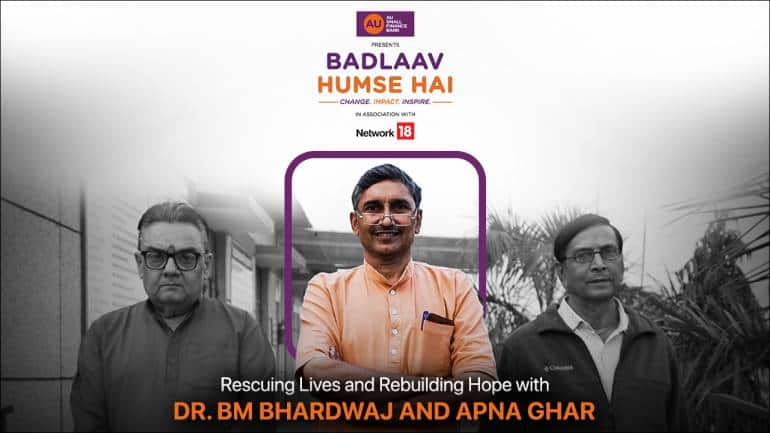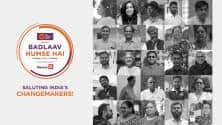
"The measure of a society is how it treats its weakest members" - Mahatma Gandhi.
In India, we sum up the basic needs of a person as 'roti, kapda aur makaan'. Of these, 'makaan' tends to be the hardest to come by. Particularly in India's burgeoning cities where costs of living continue to rise, there are those who fall through the cracks, and face an almost impossible climb back up. When a person is homeless, all other aspects of their life suffers: they have no security, no privacy, no way of keeping themselves or their belongings safe, they're exposed to the elements and have nowhere to clean themselves up.
No one sets out wanting to be homeless. Some get there through a downturn in fortunes. Others because their care and upkeep is too much for the people they depend on. Still others are abandoned in their old age. And still others are mentally, and physically ill. Once in the streets, their condition only deteriorates. This is where Dr DM Bhardwaj and Dr Madhuri Bhardwaj found their calling. Inspired by events in their own lives, they each wanted to work for the homeless and the destitute. Together, they founded the first Apna Ghar Ashram in Bajhera village in Bharatpur, Rajasthan.
Today, 61 Apna Ghar Ashrams operate in 12 states of India, and 1 in Nepal, sheltering more than 12,500 residents. Together, with their employed staff and volunteers, the Bharadwaj doctors continue to bring hope and happiness to people who are homeless and destitute, mentally and/or physically ill, old and infirm, or otherwise unable to care for themselves. Apna Ghar rescue teams often find these people at railway stations, bus stands, religious and other public places in very unhygienic, critically diseased and painful conditions.
The scale of their operation is truly impressive. Altogether, over 25,000 people have been rescued so far. Daily, over 110 doctors volunteer their services at the various ashrams, helping support the residents, including those who need specialised care. The ashrams themselves have 79 ambulances, and employ over 1,000 staff and more than 2,000 volunteers.
The Apna Ghar Ashrams are operated from a philosophy of care. The residents are referred to as "Prabhujis", which is a way of recognising them as a form of God. The focus is on healing each of these people physically, mentally and emotionally, through personalised interventions. Once these Prabhujis are rescued, the first order of business is to take care of their immediate needs: this includes emergency medical care and first aid, cleaning their wounds, helping with their hygiene, and clothing them. The Apna Ghar team works with the police to complete relevant legal formalities, making it easy for their families to find them.
They are then matched with the Ashram facilities most suited to the level of care they need. The next order of business is to take care of their nutritional needs. Often, these people haven't eaten or had access to clean water in days. Most Prabhujis are severely malnourished when they arrive at the Ashrams. They are also provided their own bedding, clothing, personal care articles and anything else they need, to be comfortable. For many, this is the first time in years they have had a sense of safety.
Once they recover, Prabhujis are encouraged to participate in the functioning of the Ashrams themselves, in addition to taking up tasks that can help them get back on their feet. The Ashram at Bharatpur has a tailoring centre that produces over 60,000 uniforms for institutions and to their own residents. It also functions as a way for women to find their way back into the workforce.
For men, small scale industries like mechanised incense stick making, and disposable plate making are under development. These will create opportunities for these men to rejoin society, in addition to helping sustain the Apna Ghar residents, making it a more sustainable operation. For Dr DM Bhardwaj and Dr Madhuri Bhardwaj, however, this is a labour of love. They don't see this work as their way of bringing succour to the destitute, but as their solemn duty as members of the human family. Fortunately for human beings everywhere, it is clear from the exponential increase in volunteers and supporters of Apna Ghar Ashrams that their tribe is growing.
To honour stories like Apna Ghar Ashram, AU Small Finance Bank presents Badlaav Humse Hai Season 2, in association with Network18. Just like the first season, Season 2 celebrates 25 stories that showcase changemakers whose unsung work has helped carve out cultural identities for communities, lifted them out of poverty; created access where only barriers existed; shown communities how to work with nature to create true sustainability; changed hearts and minds about othered communities; changed the lives of many through economic, social or educational empowerment, and much, much more.
Watch Season 2 of Badlaav Humse Hai for more stories like this one. You may also catch up on all the wonderful stories from Season 1.
Moneycontrol Journalists were not involved in the creation of the article.



